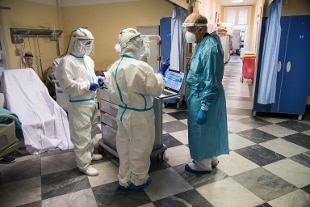The alarm of doctors and nurses: hospitals close to collapse
Share
January 11, 2021 Healthcare professionals are "always obliged, even during the crisis, to provide the best, most appropriate, reasonably possible care. However, when scarcity makes resources insufficient compared to needs, ethical principles can allow scarce resources to be allocated in order to provide necessary treatments preferentially to those patients who are most likely to benefit from it ".
This can be read in the draft of the 2021-23 Pandemic Plan, which also addresses the issue of ethical aspects related to the pandemic threat.
Planning "ethically and clinically correct - it says - must aim at guaranteeing just and equitable resources and protections, with particular attention to vulnerable groups. However, during crisis situations, fundamental ethical values allow some actions that would not be acceptable in ordinary circumstances . This does not mean, however, modifying the reference principles: instead, it is necessary to balance them in a different way ".
In crisis conditions, it is noted, "situations change, not ethical standards. For example, the imbalance between needs and available resources may make it necessary to adopt criteria for
triage
in access to therapies".
The draft specifies that "it is not allowed to act in violation of the standards of ethics and deontology, but it may be necessary, for example, to privilege the principle of beneficence over autonomy, which is particularly important in clinical medicine under ordinary conditions".
In general, it says, "solidarity must inspire every decision; interventions must always be evidence-based and proportionate; people must always be treated with respect".

